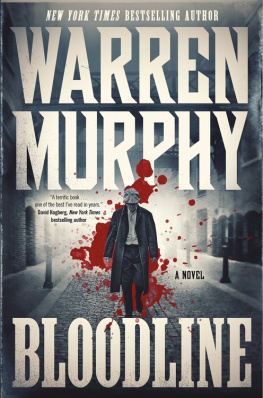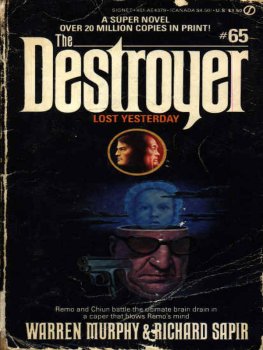***********************************************
* Title : #012 : SLAVE SAFARI *
* Series : The Destroyer *
* Author(s) : Warren Murphy and Richard Sapir *
* Location : Gillian Archives *
***********************************************
CHAPTER ONE
While Europe was a collection of warring tribes and Rome merely another city-state on the Tiber and the people of Israel shepherds in the Judean hills, a little girl could carry a sack of diamonds across the Loni Empire in East Africa and never fear even one being taken from her. If she suffered an injured eye, here alone in all the world were men who could repair it. In any village she could receive a parchment for her jewels, take it to any other village, then collect gems of exactly identical weight and purity. Waters from the great Busati River were stored in artificial lakes and channelled into the plains during the dry season, long before the Germanic and Celtic tribes that later became the Dutch ever heard of dikes or canals. Here alone, in all the world, a man could set his head on pillow without fear of attack in the night or hunger in the morning.
Historians do not know when the Loni ceased to care for their canals and dams, but by the time of the Arab slavers, the Loni were no more than a small tribe, hiding in the hills to escape mass slaughter. The plains were death dry; the Busati River flooded at will; and one in ten were blind for life. The land was ruled by the Hausat ribe, whose only governmental policy was to track down and to kill the remaining Loni.
Some of the Loni could not successfully hide, but instead of being killed, they were often taken to a spot on the river and traded for food and a drink called rum. Sometimes the person who took them went the way of his merchandise. Whole villages disappeared in chains to serve the plantations of the Caribbean Islands, South America and the United States. The Loni were very valuable indeed because, by this time, it had begun to be written that the men were strong and the women were beautiful and the race lacked the courage to resist.
In the year one thousand, nine hundred and fifty two, dated from the birth of a god worshipped in Europe, the Americas and small parts of Africa and Asia, the colony called Loniland became independent. In a stronger wave of nationalism in the 1960's the colony became Busati, and in a yet stronger wave in the 1970's, it expelled the Asians who had come with the British to open stores, when the lands along the Busati River had been called Loniland.
When the Asians fled under the policy called "Busatinization," the last people capable of mending an eye left the land of the Loni. Little girls dared not venture into the streets. No one carried valuables for fear of the soldiers. And high in the hills, the scattered remnants of the Loni Empire hid, waiting for a promised redeemer who would restore them to the glory that once was theirs.
CHAPTER TWO
James Forsythe Lippincott yelled for his boy who was somewhere in the Busati Hotel, which still used towels labelled Victoria Hotel and still had the ornate V's inscribed, embossed and sewn all over halls, drapes, bus-boys' uniforms and water faucets.
There had been no hot water since the British left, and now with the last planeload of Asians having taken off from Busati Airport the day before, there was no cold water either.
"Boy," yelled Lippincott who, back in Baltimore, would not even call a nine-year-old black child "boy." Here, he was yelling for his porter. According to the new Busati tradition, published the day before in the last edition of the Busati Times, any foreigner, most especially a white, who called a Busatian "boy" could be fined up to a thousand dollars, thrown in jail for ninety days and beaten with sticks.
But if you paid your fine in advance to the Minister of Public Safety and to the great conquering leader, Dada "Big Daddy" Obode, who that very morning had successfully defended Busati against an air invasion by America, Britain, Israel, Russia and South Africa, usingaccording to Radio Busatithe very latest in atomic planes, you would not have to pay your fine in court.
This process in Busati was called pre-guilt payment, a revolutionary system of justice.
In Baltimore the same process was called graft.
"Boy, get in here," yelled Lippincott. "There's no water."
"Yes, Bwana," came the voice from the hallway followed by a black, perspiring man in loose white shirt, loose white pants and a pair of cracked plastic shoeswhich made him one of the richer men of his village ten miles up the Busati. "Walla here to serve you, Bwana."
"Get me some fucking water, nigger," said Lippincott, snapping a towel in Walla's face.
"Yes, Bwana," said Walla, scurrying from the room.
When Lippincott had come to Busati, he fully intended to respect the proud African traditions and search for old forgotten ones. But he found quickly that this politeness earned him only derision, and besides, as the Minister of Public Safety had said:
"Bush niggers need beatings, Mr. Lippincott. Not like you and me. I know it's against our laws for a white to hit a black nowadays, but between civilized men like you and me, the only way to treat a bush native is to thrash him. They're not like us Hausa. They're not even Loni, God help them. Just poor mongrels."
It was then that James Forsythe Lippincott learned of pre-guilt payments and, as he handed over two hundred-dollar bills to the Minister of Public ^Safety, was promised, "If any of these boys give you trouble, just let me know their names. You won't see them around anymore."
In Baltimore, James Forsythe Lippincott was careful to call the maids by their marital title and last name, and to promote blacks to executive positions in the family company he ran, but in Busati he did as the Busatians. It was the only way to get things done, he told himself, and he did not even suspect how much he truly liked this method of beatings and brutality, in preference to the enlightened Baltimore way where every problem was solved by holding another seminar in race relations.
This was Busati, and if he did not follow the Busati system of beating bush niggers, well, then, would that not be a subtle form of racism, thinking his American way was superior to the Busati way?
James Lippincott examined his stubble of a beard. He had to shave it. Couldn't let it go another day or he might be mistaken for one of the hippies who regularly never returned from Busati. In Busati, a man with a clean shave and wearing a suit got some respect. Those seeking truth, beauty and a communion with man and nature, just never showed up again.
Walla rushed into the room with a soup tureen of water.
"Why did you bring that in?" asked Lippincott.
"No more pots, Bwana."
"What happened to the pots?"
"Liberated yesterday by the army, bwana. So that imperialist aggressors won't get them. Atomic planes come to steal our pots, but our great conquering leader destroyed the attackers."
"Right," said Lippincott. "A great attack by imperialistic nations." He dipped a finger into the soup tureen of water and became angry.
"This is cold, Walla."
"Yes, Bwana, no more hot water."
"You brought up boiling water from the kitchen yesterday."
"No more gas for the stove, Bwana."
"Well, how about firewood? They can certainly burn firewood. You don't need Asians to show you how to make a fire, do you?"
"Got to go upriver for wood, Bwana."
"All right," said Lippincott, annoyed. "But for every cut I get from using cold water, you get two cuts. Understand?"
"Yes, Bwana," said Walla.
Lippincott counted three, cuts on his face when he turned from the mirror and took the blade out of his safety razor.
"That's six for you, Walla."
"Bwana, I got something better for you than cutting."
Next page



